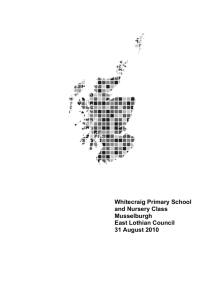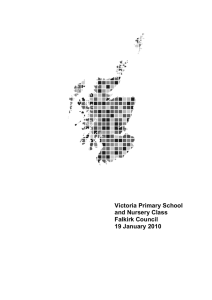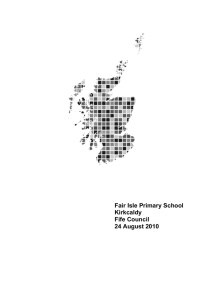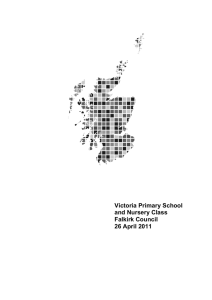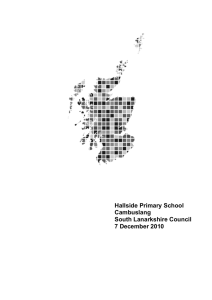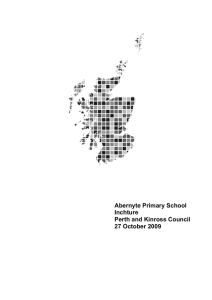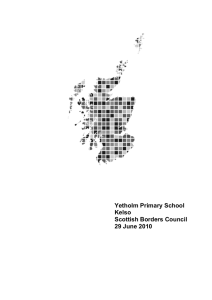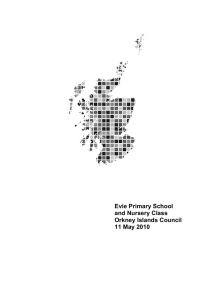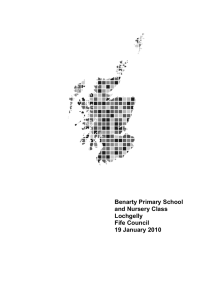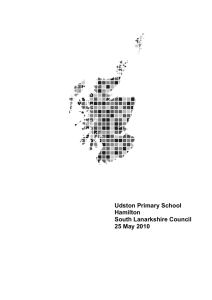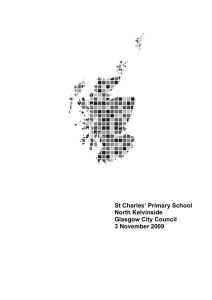Inch View Primary School and Nursery Class Perth and Kinross Council
advertisement
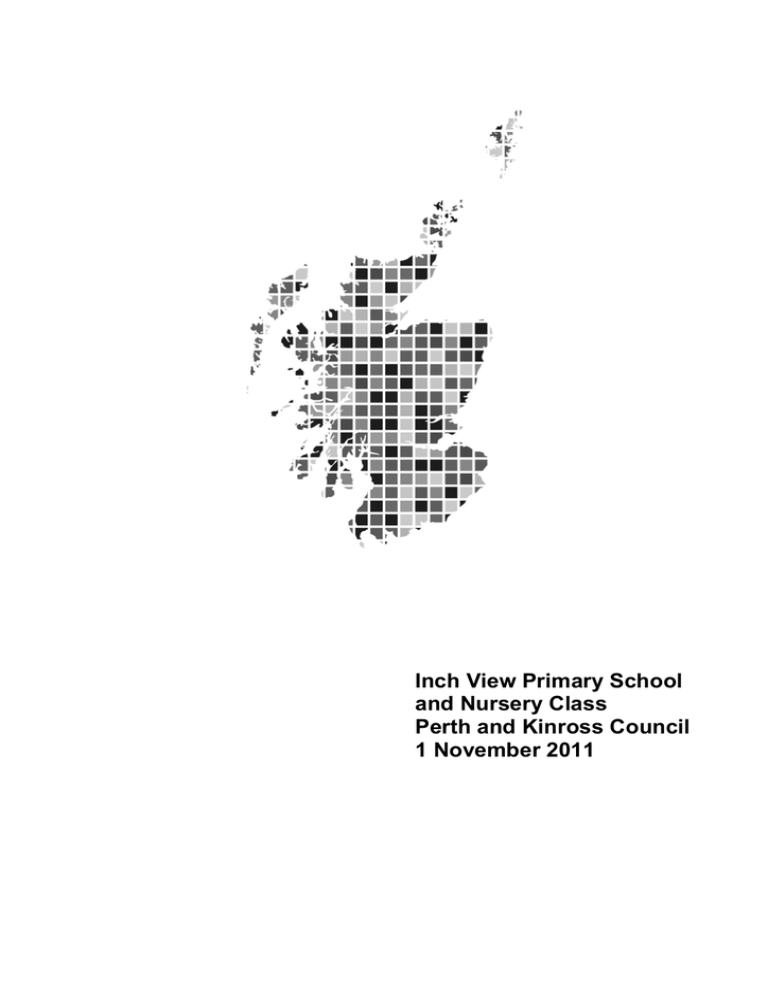
Inch View Primary School and Nursery Class Perth and Kinross Council 1 November 2011 We published a report on Inch View Primary School and Nursery Class in April 2010. That report set out key strengths of the school and areas for improvement. This follow-through report is based on an inspection visit which was carried out in June 2011. It tells you about improvements since the original inspection in the quality of education which the school1 provides. It also comments on how the school is getting on with the main points for action. First we focus on changes in the core work of the school. We explain how the school has got better at helping children to learn and benefit from being at the school. Next we look at the key processes which enable this to happen, including the involvement of parents2. Our report also describes developments in the ‘ethos’ of the school, by which we mean how well children are cared for and how much is expected of them in all aspects of school life. Finally we comment on improvements in leadership to help the school achieve its aims. A copy of this report has been placed on the HMIE website www.hmie.gov.uk. Where applicable, you will also find analyses of questionnaire returns. 1 2 The term ‘school’ is used to include the work of the nursery class, where relevant. Throughout this report, the term ‘parents’ should be taken to include foster carers, residential care staff and carers who are relatives or friends. Contents 1. The school 2. Particular strengths of the school 3. How well do children learn and achieve? 4. How well do staff work with others to support children's learning? 5. Are staff and children actively involved in improving their school community? 6. Does the school have high expectations of all children? 7. Does the school have a clear sense of direction? 8. What happens next? 1. The school Inch View Primary School and Nursery Class serves an area of the city centre and South Perth district including Friarton. Since the last inspection the acting headteacher has taken up post on a permanent basis. 1 2. Particular strengths of the school • The positive start made by the headteacher and senior management team in involving parents, staff and pupils in improving the school. • Improvement in achievement, particularly in children’s writing. • The quality of support for children experiencing difficulty in their learning. • Work of staff at the early stages to develop continuity in learning for children moving from nursery to primary one. 3. How well do children learn and achieve? In the nursery class and early stages children are settled and take part enthusiastically in a wide range of activities. Children in the nurture class are developing skills which help them to work together and focus on tasks. Across the school children listen well to adults and each other. In most lessons they work well together to carry out tasks in pairs and groups. When appropriate, children work well without close supervision. In almost all lessons teachers explain tasks and activities clearly. In a few lessons tasks are too teacher directed and lack challenge. Children are increasingly being involved in planning and making decisions about their learning. Children’s learning experiences are enhanced by visitors to the school and visits to the local community. Across the school, children are making good progress in their learning and are attaining well. There have been significant improvements in the quality of children’s writing. In the nursery class and at the early stages children are progressing well and developing good skills in early writing. They are learning to count and use numbers as part of 2 their topic work on fairytales. At the middle stages, children are able to identify the main points in newspaper and television reports and use these effectively when writing reports on animal charities. In the upper stages children are able to write extended pieces of descriptive writing. Across the school children are making good progress in mathematics. Children use information communications technology very well to support their learning particularly in mathematics. Staff are now developing a shared understanding of the principles of Curriculum for Excellence. Teachers are developing confidence in using experiences and outcomes to plan in most curricular areas. Activities build on children’s learning and ensure continuity in areas such as language development and physical education. Staff now need to take forward plans to develop the mathematics curriculum in line with Curriculum for Excellence. 4. How well do staff work with others to support children's learning? Parents are now involved more fully in their children’s learning. The school provides information through newsletters and information evenings. The Parent Council provides a high level of support for the school. Parents are consulted on aspects of the work of the school including communication and homework. They have been involved in the development of personal learning planning. Staff continue to work with a range of agencies to support children experiencing difficulties in their learning. Support for learning assistants provide high-quality support for individuals and groups. 5. Are staff and children actively involved in improving their school community? Children now have more opportunities to take responsibility for developing aspects of the work of the school and improving the community. They are able to offer suggestions for improving the work 3 of the school through the house system. Children have also worked with community police to promote road safety. Staff now contribute more to improving the work of the school. They visit each other’s classes in order to learn from each other and to improve their practice. Individual teachers have led staff development sessions on topics such as planning, cooperative learning and active mathematics. The headteacher and depute headteachers visit classes and provide staff with feedback to help them improve. The local authority has made a number of changes within the campus and this has improved road safety. They should now take forward plans to construct a more permanent barrier between the P1 playground and the car park. 6. Does the school have high expectations of all children? Almost all staff have raised their expectations of children’s achievements. The school now has procedures in place to track children’s progress in English language and mathematics and this is helping staff to increase the pace of children’s learning and attainment. Children’s achievements are celebrated in bright wall displays, with certificates, during assemblies and in the media. 7. Does the school have a clear sense of direction? The headteacher is highly committed to the school and has successfully worked with the management team and staff to improve performance and self-evaluation. Most teachers have a shared understanding of the strengths of the school and what needs to improve. The headteacher should take forward plans to work with staff, parents and children to develop a revised vision for the school. This will help all teachers to clarify their responsibilities in supporting inclusion. With the continuing support of the authority the school has the capacity to improve further. 4 8. What happens next? Under the leadership of the headteacher the school has improved various aspects of its work since the original inspection. The school now performs better overall. Staff now need to build on this work to ensure consistently high-quality experiences for children at all stages. The school, with support from the education authority, has the capacity for further improvement. We will make no further visits in connection with the inspection report of April 2010. HM Inspector: Jacqueline Horsburgh 1 November 2011 5 When we write reports, we use the following word scale so that our readers can see clearly what our judgments mean. excellent very good good means means means satisfactory weak unsatisfactory means means means outstanding, sector leading major strengths important strengths with some areas for improvement strengths just outweigh weaknesses important weaknesses major weaknesses If you would like to find out more about our inspections or get an electronic copy of this report, please go to www.hmie.gov.uk. Please contact us if you want to know how to get the report in a different format, for example, in a translation, or if you wish to comment about any aspect of our inspections. You can contact us at HMIEenquiries@hmie.gsi.gov.uk or write to us at BMCT, HM Inspectorate of Education, Denholm House, Almondvale Business Park, Almondvale Way, Livingston EH54 6GA. Text phone users can contact us on 01506 600 236. This is a service for deaf users. Please do not use this number for voice calls as the line will not connect you to a member of staff. You can find our complaints procedure on our website www.hmie.gov.uk or alternatively you can contact our Complaints Manager, at the address above or by telephoning 01506 600259. Crown Copyright 2011 HM Inspectorate of Education
